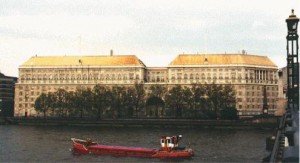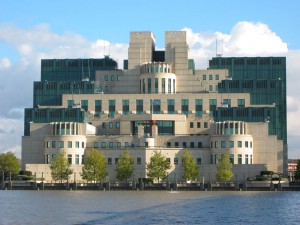Published on www.politics.co.uk, and Huffington Post UK.
Following the awful murder of Drummer Lee Rigby in Woolwich last week, the political securocrats who claim to represent the interests of the British intelligence services have swung into action, demanding yet further surveillance powers for MI5 and MI6 “in order to prevent future Woolwich-style attacks”.
As I’ve written before, it was heartening that the UK Prime Minister said in the aftermath of the attack that there would be no knee-jerk security reaction. However, that has not deterred certain intelligence sock-puppets from political opportunism — they stridently call for the resurrection of the draft Communications Data Bill that was earlier this year kicked into the long grass. If the hawks are successful, the new law would have implications not only for our freedoms at home, but also for our policy and standing abroad.
Recently the civil liberties camp acquired a surprising ally in this debate, with MI5 unexpectedly entering the fray. And rightly so. There is absolutely no need for this new legislation, the requisite powers are already in place. Senior security sources have argued that those citing the Woolwich attack to promote the snoopers’ charter are using a “cheap argument”.
As I said in this recent BBC radio interview, all the necessary laws are already in place for MI5 either to passively monitor or aggressively investigate persons of interest under the original terms of IOCA (1985) and updated in the Regulation of Investigatory Powers Act (RIPA 2000).
There now appears to be little doubt that the two Woolwich suspects were well and truly on the MI5 radar. It has been reported that they had been targets for at least 8 years and that Michael Adebolajo had been approached to work as an agent by MI5 as recently as 6 months ago.
One of his friends, Abu Nusaybah, recorded an interview for BBC’s Newsnight programme last week, only to be arrested by counter-terrorism police immediately afterwards. He stated that Adebolajo had been tortured and threatened with rape after his arrest in Kenya en route to Somalia, and that this treatment may have flipped him into more violent action. Indeed, the tale gets ever murkier, with reports yesterday stating that Adebolajo was snatched by the SAS in Kenya on the orders of MI5.
Other information has since been released by the organisation CagePrisoners indicating that Adebolajo’s family and friends had also been harrassed to pressurize him into reporting to MI5.
All of which obviates the early claims that Adebolajo was either a “lone wolf” or a low-priority target. It certainly indicates to me that MI5 will have at the very least been monitoring Adebolajo’s communications data, especially if they were trying to recruit him as a source. If that indeed turns out to have been the case, then without doubt MI5 will also have been intercepting the content of his communications, to understand his thinking and assess his access. Anything less would have been slipshod — a dereliction of duty — and all this could and should have been done under the existing terms of RIPA.
So what are the chances of some real oversight or answers?
If we’re talking about an independent inquiry, the chances are slim: the Inquiries Act (2005) passed little noticed into law, but it means that the government and the department under investigation can pretty much determine the scope and terms of the inquiry to which they are subject.
However, might we nail the flag of hope to the mast of the Intelligence and Security Committee of Parliament (ISC) — the committee tasked with overseeing the work of the UK intelligence agencies? The new DG of MI5, Andrew Parker, has already submitted a written report about Woolwich and will be giving evidence to the ISC in person next week about whether MI5 missed some vital intelligence or dropped the ball.
Th ISC of Parliament was established as part of the Intelligence Services Act (1994) — the law that finally brought MI6 and GCHQ under the umbrella of notional democratic oversight. MI5 had already come into the legal fold with the Security Service Act (1989).
As I have written before, initially the ISC was a democratic fig-leaf — its members were appointed by the PM not Parliament, it reported directly to the PM, and its remit only covered the policy, finance and administration of the UK’s intelligence agencies.
Until this year the ISC could not investigate operational matters, nor could it demand to see documents or question top spooks under oath. Indeed, it has been well reported that senior spies and police have long evaded meaningful scrutiny by being “economical with the truth”.
Former MI5 DG Sir Stephen Lander in 2001 said “I blanche at some of the things I declined to tell the committee early on”; a more recent DG, Sir Jonathan Evans, had to admit in 2008 that MI5 had lied about its involvement in torture; and Lord Blair, former Commissioner of the Metropolitan Police, had to apologise in 2008 for misleading the ISC about the number of thwarted terrorist attacks on his watch.
However the current Chair of the ISC, Sir Malcom Rifkind, has pursued a more muscular oversight role. And it seems he has at least won some battles. The one good element to have come out of the contentious Justice and Security Act (2013) appears to be that the ISC has more direct accountability to Parliament, rather than just to the PM (the devil is expressed in the detail: the ISC is now “of” Parliament, rather than “in” Parliament…).
Somewhat more pertinently, the ISC can now investigate operational matters, demand papers and witnesses, and it appears they now have a special investigator who can go and rummage around the MI5 Registry for information.
It remains to be seen how effective the ISC will realistically be in holding the intelligence agencies to account, even with these new powers. However, Sir Malcolm Rifkind has good reason to know how slippery the spies can be — after all, he was the Foreign Secretary in 1995/6, the years when MI6 was funding Al Qaeda associates to assassinate Colonel Gaddafi of Libya. The attack went wrong, innocent people were killed and, crucially, it was illegal under UK law, as MI6 had not requested the prior written permission for such a plot from the Foreign Secretary, as required under Section 7(1) of the aforementioned ISA (1994). Rifkind has always claimed that he was not told about the plot by MI6.
So, in the interests of justice let us hope that the Rifkind and the other members of the ISC fully exercise their powers and that MI5’s new DG, Andrew Parker is somewhat more frank about the work of his agency than his predecessors have been. It is only through greater honesty and accountability that our intelligence agencies can learn from the mistakes of the past and better protect our country in the future.




















